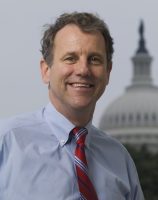U.S. Sen. Sherrod Brown (D-OH) said the regulatory relief bill currently being considered in the Senate will increase the deficit and raise the likelihood that a systemically important financial institution (SIFI) will fail.

Brown is referring to the Economic Growth, Regulatory Relief and Consumer Protection Act (S. 2155), which the Senate is expected to vote on this week.
Specifically, the bill would exempt most community banks from the Volcker Rule, expand access to the Federal Reserve’s Small Bank Holding Company Policy Statement to help more community banks build capital, improve regulatory treatment of reciprocal deposits and certain municipal securities, include higher asset thresholds for systemically important financial institution designations, and ease stress testing requirements.
Further, it would exempt certain community bank loans from escrow requirements, simplify community bank capital requirements, create a short-form call report for use in the first and third quarters by some community banks, expand eligibility for the 18-month regulatory examination cycle to more community banks, and ease appraisal requirements to facilitate mortgage credit in local, rural communities.
In his criticism of the bill, Brown cited a report from the non-partisan Congressional Budget Office that said the bill will increase the likelihood that a SIFI will fail.
“CBO’s estimate of the bill’s budgetary effect is subject to considerable uncertainty, in part because it depends on the probability in any year that a systemically important financial institution (SIFI) will fail or that there will be a financial crisis. CBO estimates that the probability is small under current law and would be slightly greater under the legislation,” stated the CBO.
The CBO also estimates that the bill will increase the federal deficit by $671 million.
“The independent budget scorekeeper confirmed what we know – this bank giveaway bill will cost taxpayers,” Brown said. “Hardworking Americans shouldn’t have to pay for favors to Wall Street, foreign megabanks, and their lobbyists.”